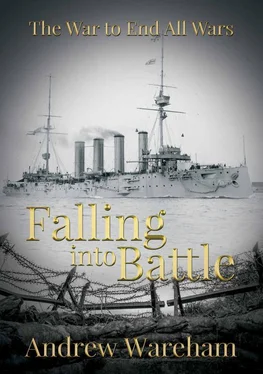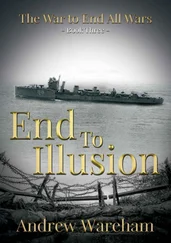“Yes, sir.”
Carter’s flat response made it clear he thought about very little.
“Organise a hot meal for the men, and the German prisoners, Carter.”
“Aye aye, sir.”
Carter was far happier with that command – he could do things far more easily than think about them.
No wind; no enemy – the tow was without incident until they were picked up by a pair of harbour tugs at Dunkirk. The little paddle-steamers made a quick job of taking the cable and nudging the German ship alongside a wharf. Simon then had the job of contacting the shore authorities and explaining who and what they were. In the absence of radio aboard destroyers, they had no knowledge of the ship.
The Captain of the Port listened and then showed blank; he did not expect to receive captured German vessels.
“Should have taken her to Harwich. Your home port.”
“Weather forecast suggested strong winds from the north, sir. Too great a risk to tow her across the North Sea with only a single destroyer, sir.”
Weather forecasts were commonly wrong but could not be ignored.
“Accepted. She had to come here. What the hell do I do with her?”
“She might have a useful cargo, sir. Big ship. Might be valuable. The Admiralty might have a use for her.”
“Hah! Good argument, boy! Take an inventory and pass the word to Their Lordships.”
“I took her papers, sir. Here.”
“Well done. I can’t read them… Bound to be someone here who can. I’ll deal with that. Best thing for you is to get aboard your destroyer and return to your own ship. Did you say you were First Lieutenant of Sheldrake ?”
“Yes, sir.”
“You can’t be twenty.”
“Just, sir.”
“That uniform’s not so old… How long have you been a lieutenant?”
“Six months, sir. Destroyers push young men hard, sir.”
“Where were you before?”
“ St Vincent , sir. Two years as a mid.”
“Good ship. Bit different to a destroyer!”
“Yes, sir. Surprised me at first. Came to like it, sir.”
“Well, you’ve done a good job here, young man. Off you go, now.”
Robin’s captain was waiting for orders, in case the authorities in Dunkirk refused to accept the merchantman and told her to take the ship elsewhere.
“Port Captain fancies telling the Admiralty he has a captured ship with maybe a hundred thousand pounds worth of stores, sir.”
“Well done, thou good and faithful servant! We do the work, he gets the glory. Thus it ever was in the Navy. Get your head down, Sturton. You look knackered!”
“Bit tired, sir. No sleep for the wicked!”
“You’re too young to be wicked! Off you go.”
Hector McDuff was exhausted.
The South Atlantic winter had turned to a vicious, tumultuous spring, gales alternating with near-hurricanes without cease for two months. Good Hope had pitched and rolled and continued to patrol, returning to port only for the cruel labour of coaling in a harbour with no bunkering facilities other than mounds of coal and shovels.
Good Hope used her own derricks to swing the coal aboard from the coaling hulk - an ancient ship said to have been one of Brunel’s original vessels and one of the first ocean-going steamers - being taller than the occasional merchant ship that used the facilities and the harbour cranes. Part of the crew boarded the hulk and shovelled coal into sixteen thousand of the one hundred and forty pound sacks and lifted them into cargo nets by hand. The steam derricks swung the nets up on deck and the hands there carried them in small trucks to the coaling chutes and lifted the sacks and emptied them before running back to drop the sacks into the nets and pick up the next load. Down in the bunkers, unventilated and almost without light, the stokers shovelled the coal to the sides away from the chutes, levelling the mounds so that they would not shift at sea. The job was done at the run, without let up, so that the ship could get back to sea as quickly as possible – the patrol had to be maintained as nearly unbroken as possible.
When coaling ended the ship had to be cleaned – coal dust spread everywhere. The bread baked in the ship’s ovens for the next two days showed tiny black speckles, it being impossible to completely seal the flour bins.
There was no shore leave in Port Stanley – mostly because there was nothing to do. The men waited hopefully for the order to return to Cape Town, which catered to the needs of sailors, but they were sent back out to Cape Horn every time.
The buzz went round that the Navy had lost the Tsingtao Squadron – they did not know where the German ships were except that they did not seem to have left the Pacific or Indian Oceans, which amounted to about half of the world’s seas.
Another rumour followed that the British consuls along the Pacific coast of South America had seen German colliers, presumably chartered to supply the Tsingtao Squadron.
Good Hope modified her patrols to take her a few degrees north along the coast of Chile as well as Cape Horn and the Magellan Passage.
General opinion was that the Tsingtao Squadron would make a rendezvous with their colliers in the Galapagos Islands, would coal in the sheltered waters and then head north to beat up the Canadian West Coast before making a raid on Japan and Vladivostok and then heading back into Chinese waters where they would seek asylum in a neutral port, one that was not a Western Concession.
“Won’t come within a thousand miles of us, McDuff. They know we’re here and that there will be support coming up as well. Old Canopus will be here before too long, with her twelve inch guns. That will put a stopper on any ambitions they might have towards Cape Horn.”
“Canopus is only good for eight knots they say, sir, when her engines are working at all.”
“Nothing to worry about, my boy! All we have to do is block the passage. The Huns have got to come to us! Not that they will be coming at all.”
The Gunnery Lieutenant Commander had no fears at all for the future. If the Huns did appear, they would be anxious to traverse Cape Horn and would have no choice other than come to close range.
“They close us and we will have them, my boy – no question of that. Good Hope and Monmouth will deal with their eight inch cruisers and Glasgow and Otranto will put down their lighter ships. The whole business won’t take an hour at a range of five thousand yards.”
“What if they stay outside fifteen thousand, sir?”
“Why would they do that? Close to maximum range for their eight inchers, they would never hit us while we might scatter a few of our nine point two bricks among them. All that would achieve would be to give us their position. We would be on the old wireless to Port Stanley and they would send their telegrams off to the Admiralty and inside the hour there would be a net of big ships closing in from the Pacific and the Atlantic. Take a week at most to catch them once we had them located. They know that. If they come this way, it must be to go to battle – and that means broadsides at close range. Can’t be anything else!”
Sublieutenants did not argue with lieutenant commanders.
“Thank you, sir. I hadn’t thought the implications through.”
“Not your job to, Sub. You just keep your gun up to scratch – we’ll do the hard work! Nothing to worry about – we’ve got Admiral Craddock! Did really well against the Boxers, you know!”
Hector was not entirely sure that Boxers with spears were to be compared to Germans with eight inch guns – but it was not his role to criticise admirals.
“Good old Kit Craddock, sir! He’ll deal with any number of Huns, that’s for sure!”
Читать дальше












